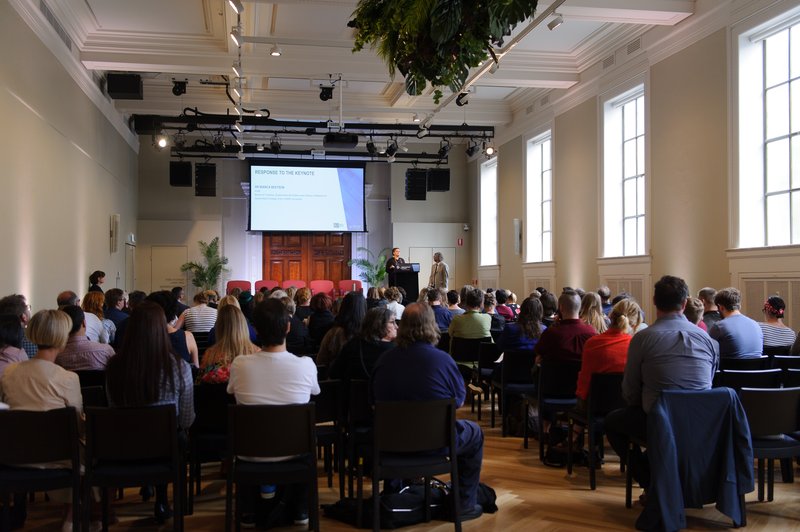Arts leaders urge policy and investment to strengthen Australia’s democracy
Media Release
Media Release

The urgent need to implement cultural policy that strengthens our democracy and repairs industry damage was highlighted at Australian Cultural Policy: The Next Decade at the State Library of Victoria on Monday 8 April.
Speakers across the entire day emphasised the role artists play in creating the work that elevates arts organisations into the cultural institutions most trusted and admired by Australians.
The role of the arts in inspiring active, ethical citizenship was also a recurring theme, with the state of the Australian culture characterised as perilously preyed upon by the voices of hate.
And yet while artists create significant cultural value, that value is not returned to artists in cultural nor in economic terms. Researchers shared data showing downward trends for artists’ careers and working conditions: average incomes from creative work are below the poverty line and falling; artists’ copyright is under attack; 98% of Australians participate in the arts, and yet artists are not widely respected as professionals; the gender pay gap is worse in the arts than in any other industry; and the arts is the second-highest risk sector for sexual harassment.
Shadow Minister for the Arts the Hon Tony Burke directly addressed the need for a cultural policy: “The more I've seen of what happens without one, the more I've become convinced of the necessity for one... An arts policy that starts with the audience is an entertainment policy. An arts policy that starts with artists is a cultural policy... I want artists to be courageous.”
Gabi Gabi / Kabi Kabi and Wiradjuri artist and academic Dr Bianca Beetson gave the artists’ keynote and response to Mr Burke: “We need a national cultural policy that’s grounded in First Nations sovereignty and the NAVA Code of Practice... Cuts to the arts affect the Australian identity.” Dr Beetson spoke of the need to legislate against fake ‘Aboriginal-style’ art and its cultural harm, to establish a national Aboriginal arts authority, keeping places and a repatriation fund, as well as climate change policy because there are several sacred sites currently at risk of permanent loss to rising sea levels.
Monash University’s Masters of Cultural & Creative Industries and NAVA presented Australian Cultural Policy: The Next Decade to unite the cultural sector in identifying ways forward for public policy and investment.
The comprehensive Australia-wide sector representation included First Nations arts, architecture and planning, artist-run initiatives, broadcasting, contemporary arts, games, libraries, literature, live music, museums and galleries, performing arts and screen, as well as academics, industry peak bodies, philanthropy, think tanks and unions. Government attendees were from the departments of Communications and the Arts, Foreign Affairs and Trade, and Disability, as well as several local and state governments.
Sessions on the state of the Australian culture, the evidence base, policy for the new decade, and the public interest, characterised the arts sector and offered ways forward.
Policy proposals included meaningful reporting and funding consequences for cultural diversity including First Nations, gender, disability and geography; local content quotas for streaming companies, and a digital content levy that could be drawn upon to substantially increase funding to the arts; and a sophisticated approach to the role of place in culture, including regional and remote as well as urban centres and city-making, in order to redirect the value created by artists back to artists and their communities rather than displacing creative communities and profiteering from gentrification.
Consistent across the day was a call for cultural and not creative industries policy. While working conditions need to be redressed through regulation and sector standards such as the NAVA Code of Practice, the role of the arts in education, physical and mental health, resilience, citizenship, and place-making, must be understood and strengthened through comprehensive cultural policy. The cultural institutions that strengthen Australian democracy depend on the work of artists who are able to sustain healthy careers.
In times characterised by many speakers as dominated by homogeneous voices quashing cultural diversity, we must invest in the full diversity of artists whose work searches our emotions, deepens our thinking, defines what’s possible and defies what’s impossible.
Australian Cultural Policy: The Next Decade was co-facilitated by Monash University’s Dr Ben Eltham and NAVA’s Esther Anatolitis.
“Rebuilding a social democratic vision of culture is crucial right now,” said Dr Ben Eltham. “We’ve been globally successful in Australia in building key national cultural institutions that people trust. When we get those right, when we can sustain them, we can build a larger vision for a democratic Australia.”
At the event NAVA also launched the artist video that articulates the Invest In Artistic Courage campaign.
“A budget surplus means nothing if there’s a deficit of vision,” said Esther Anatolitis. “In these difficult times where the relationship between hate speech and violence is clearly understood yet not redressed, we need a comprehensive approach to cultural policy that works across multiple portfolios – and does so sensitively and courageously. The best way to overcome oppressive, bullying hate is to invest in the creation of our own culture and in the artists who create our future.”
Podcasts of individual talks and panel sessions will be released within the coming week, and Dr Ben Eltham will release a discussion paper outlining key policy priorities.
Photo by Sarah Walker